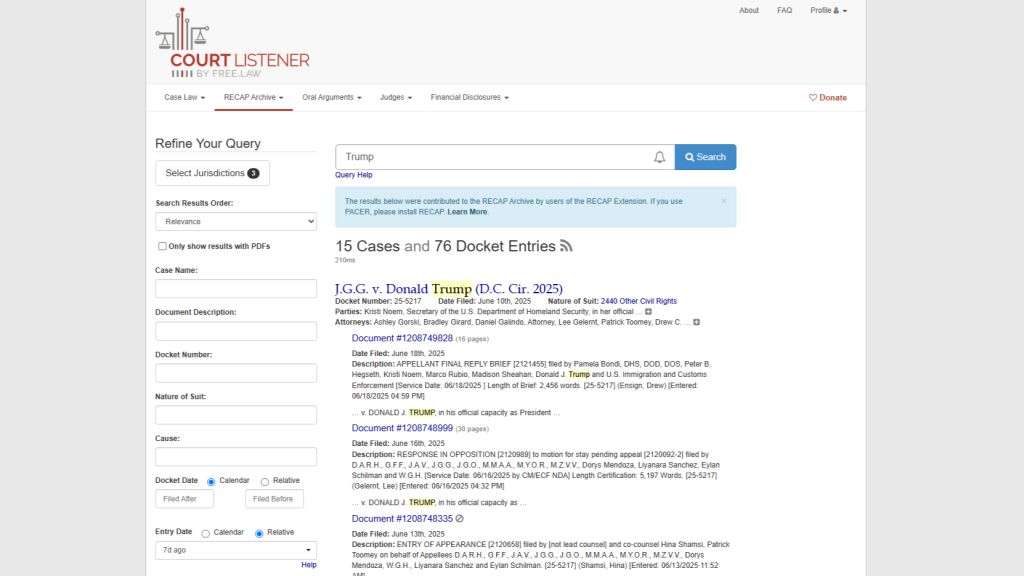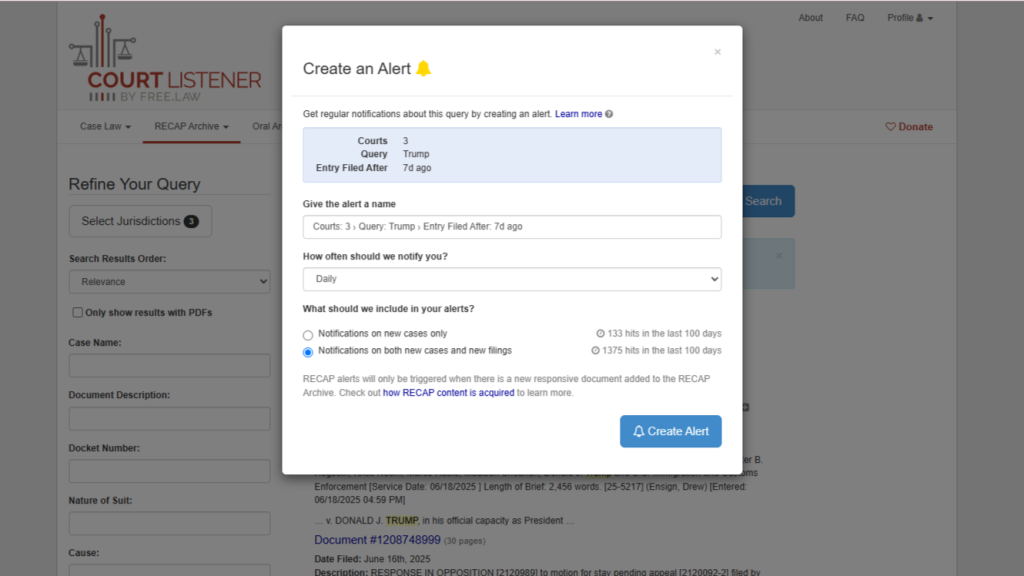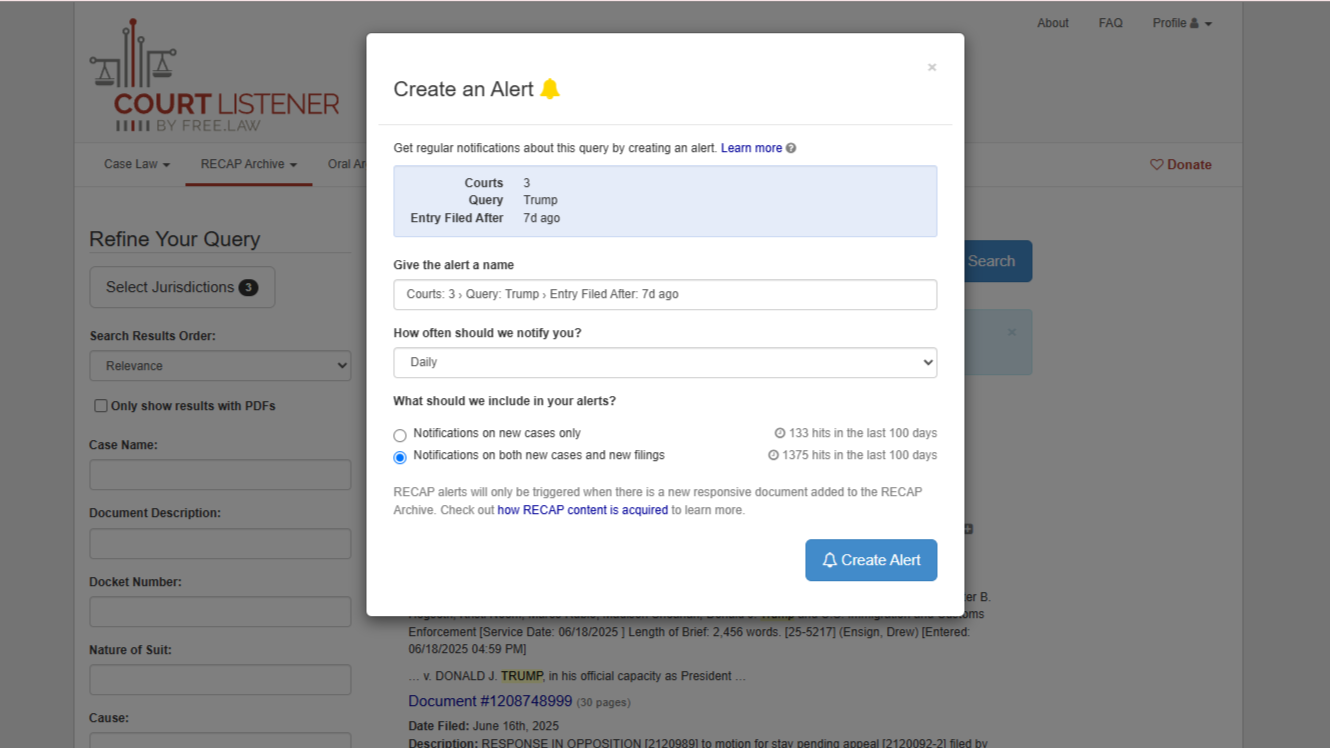Free Law Project’s CourtListener has launched RECAP Search Alerts, a new feature that allows users to monitor federal court filings for specific keywords, people, or topics, and receive alerts when there is a match. The service, which went live this week, represents what the organization calls “Google Alerts for federal courts, but much better.”
RECAP Search Alerts builds upon CourtListener’s existing RECAP archive, which contains the largest open collection of federal court docket data on the internet. The archive includes nearly every federal case, hundreds of millions of docket entries, and tens of millions of legal documents. What makes this new feature significant, the organization says, is that it transforms this static repository into an active monitoring system.
The alerts work based on a user’s saved search queries. Whenever new PACER filings match those saved searches, the user is notified. While CourtListener already had a docket-alerts feature, it only monitored specific cases for updates. With search alerts, users can cast a much wider net to catch new cases or filings that mention particular terms, people, organizations or topics.
Applications Across Industries
For lawyers, the potential use cases are clear. A lawyer could track filings that mention a client or that fall under a specific nature-of-suit code.
But Stephanie Taube, who manages product development for Free Law Project, told me the service is versatile and can be useful to professionals in various industries.

To set up an alert, start by performing a search of the RECAP archive and applying any filters you wish to add. Then click the bell icon in the search bar.
Journalists can monitor for mentions of people or organizations on their beat. Academic researchers studying particular legal topics can track citations to specific cases or legal precedents. Investors can monitor for mentions of publicly traded companies in court documents, potentially catching important litigation before it becomes widely known.
Free and Paid Versions
There is no cost to use the service, but the free version comes with limits. Free users will be limited to five daily alerts.
Paid membership tiers offer increased functionality. The first tier costs $10 monthly and provides 10 daily alerts plus five real-time alerts. Higher tiers at $25, $50 and $100 offer progressively more alerts, with the highest tier providing 50 real-time alerts and 100 daily alerts.
The distinction between daily and real-time alerts is important to understand. Daily alerts arrive in batches, while real-time alerts notify users as soon as new matching content appears in the system. For time-sensitive legal matters or breaking news situations, real-time alerts provide potentially crucial immediacy.
Boolean Search and Filtering
The system leverages CourtListener’s existing Boolean search capabilities, allowing users to construct complex queries that can capture nuanced legal concepts or specific combinations of terms. Users can apply various filters, including jurisdiction-specific searches and date ranges, both absolute and relative.

Once you click the bell icon, a window opens with options to set the frequency and types of notifications you wish to receive.
However, there is one inherent limitation to this system. RECAP relies on community contributions rather than direct access to PACER. Users install the RECAP extension within their browser, and then every time they purchase a document on PACER, it is automatically added to the RECAP archive.
This means some federal court filings might not immediately appear in the system, or might never appear if no one with the RECAP extension views them in PACER.
One way this new RECAP Search Alerts feature addresses this is through relative date filtering. Since older documents sometimes get added to the system and show up in current search results, relative date filtering allows users to specify when they only want alerts for documents filed within a relative date range, such as the last week, month, or year. That avoids notifications about outdated filings.
A user can also use a static date filter (such as filed after June 1, 2025), but with relative filtering, a “last month” search remains fresh to within the last month, long after the search filter was created.
Limits on Popular Terms
One other limitation I encountered involved searches for popular terms. If, for example, I search “trump,” the results show some 60,000 cases and 250,000 docket entries. If I then try to set up an alert for “trump,” I am not able to. Instead, I get this response:
“This query averages about 214 results per day. This is more than our system can support and may create a lot of messages in your inbox. Please narrow your query to have fewer results per day.”
I tried limiting the search to federal district courts in California, New York and the District of Columbia, and it still told me the results would be too numerous to allow me to create an alert.
The same thing happened if I tried to search for the name of a popular company. I tried Microsoft, with no filters, and was unable to create an alert, even if I limited it to just the past week. But if I limited the search to courts in the 9th Circuit, then I could create an alert.
So the trick seems to be to avoid searches for popular names. If you do search for a popular name, use filters or nature-of-suit codes to limit the results.
Enterprise and API Access
For organizations requiring large-scale monitoring, Free Law Project offers API and webhook access currently in beta testing. This allows enterprises to set up thousands or millions of alerts and integrate notifications directly into their existing workflows. Rather than managing alerts through the web interface, organizations can programmatically create and manage their monitoring systems.
The API approach opens possibilities for sophisticated legal technology applications, Taube said. Law firms could automatically monitor for competitors’ activities, compliance teams could track regulatory developments, and news organizations could systematically monitor litigation involving their coverage areas.
Future Enhancements
Taube said that the launch of this feature represents the culmination of an eight-year wish list item that proved technically challenging to implement. The difficulty lay in creating a system that could efficiently monitor the massive and constantly growing RECAP database for new content matching potentially thousands of different search queries.
Now, Taube said, Free Law Project plans to expand the service beyond email notifications to include text message and Slack alerts, recognizing that different users prefer different communication channels.
Bottom Line
For legal professionals, journalists, researchers, and anyone who needs to monitor federal court activities, RECAP Search Alerts represents a significant new capability.
The combination of Free Law Project’s extensive database, advanced search capabilities, and flexible alert system creates a useful tool for staying informed about developments in federal litigation.
 Robert Ambrogi Blog
Robert Ambrogi Blog